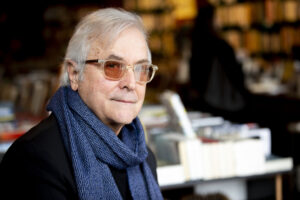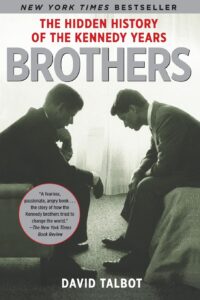
A portrait of David Talbot at The Green Arcade bookstore, Wednesday, Jan. 8, 2020, in San Francisco, Calif. Talbot shares his experiences following his stroke in his new book, Between Heaven and Hell.
The Assassination Archives and Research Center, in cooperation with the Mary Ferrell Foundation, announces an extraordinary research resource: The Talbot-Croft Archive. This archive features the recorded conversations and transcriptions that were developed as primary sources in researching David Talbot’s books, Brothers: The Hidden History of the Kennedy Years (2007) and The Devil’s Chessboard: Allen Dulles, the CIA and the Rise of America’s Secret Government (2015).
This project is made possible with the permission of the author, David Talbot and his long-time research associate, Karen Croft, whose participation and involvement was integral to the creation and collection of these materials.
 Interviews preserve and document perhaps our most precious resource, the stories of those who have made history as told in their own words. It is through the dedicated efforts of historians, authors, the men and women who practice objective and accountable investigative journalism, by which we may delve most deeply into our past. For those to whom history is more than the record and analysis of documented events, little can be of greater value than the candid reflections of those whose lives have influenced its shaping. History may have many authors and many voices, but once those figures have passed and those voices stilled, we are left to study what remains: the documented record of their words and deeds.
Interviews preserve and document perhaps our most precious resource, the stories of those who have made history as told in their own words. It is through the dedicated efforts of historians, authors, the men and women who practice objective and accountable investigative journalism, by which we may delve most deeply into our past. For those to whom history is more than the record and analysis of documented events, little can be of greater value than the candid reflections of those whose lives have influenced its shaping. History may have many authors and many voices, but once those figures have passed and those voices stilled, we are left to study what remains: the documented record of their words and deeds.
“The greatest brotherly duo in American political history. They gave their lives for the country — and they died for a reason, not simply at the hands of two ‘lone nuts.’ Those who know the true story of the Kennedy brothers’ lives (and I’m not talking about the PBS version) know how truly heroic they were.”
— David Talbot speaking about John and Robert Kennedy, (2016)
 This introduction addresses two equal sides reflected within this project for which David Talbot is responsible. The first pertains to the unique value of unscripted and unrehearsed personal interviews with historical figures. The second, of course, must recognize the strength of David’s ethics, his social conscience, his deeply compassionate conception of literary and social objectives which convey his concerns about where things have gone terribly wrong and how, if we are all properly informed (hidden history-wise), we can work together to make our society better for all. In considering essential points that should be communicated in this introduction, we acknowledge the inseparable connection between the stories he chooses to explore, his intrinsic determination to focus his attention upon darkly complex and meaningful subjects and the absolute integrity of his personal and professional character. It is sometimes said that great works are the product of great souls. David’s life and his works exemplify the best of what it was to which John and Robert Kennedy, and the band of brothers who served them, were so passionately committed: Full use of your powers along lines of excellence.
This introduction addresses two equal sides reflected within this project for which David Talbot is responsible. The first pertains to the unique value of unscripted and unrehearsed personal interviews with historical figures. The second, of course, must recognize the strength of David’s ethics, his social conscience, his deeply compassionate conception of literary and social objectives which convey his concerns about where things have gone terribly wrong and how, if we are all properly informed (hidden history-wise), we can work together to make our society better for all. In considering essential points that should be communicated in this introduction, we acknowledge the inseparable connection between the stories he chooses to explore, his intrinsic determination to focus his attention upon darkly complex and meaningful subjects and the absolute integrity of his personal and professional character. It is sometimes said that great works are the product of great souls. David’s life and his works exemplify the best of what it was to which John and Robert Kennedy, and the band of brothers who served them, were so passionately committed: Full use of your powers along lines of excellence.
His works are a gift to all of us who are haunted by living in a society that emerged after our hopes, and perhaps our destinies, were disrupted by gunfire.
Some work of noble note, may yet be done,
Not unbecoming men that strove with Gods.
The lights begin to twinkle from the rocks:
The long day wanes: the slow moon climbs: the deep
Moans round with many voices. Come, my friends,
‘T is not too late to seek a newer world.
Push off, and sitting well in order smite
The sounding furrows; for my purpose holds
To sail beyond the sunset, and the baths
Of all the western stars, until I die.
It may be that the gulfs will wash us down:
It may be we shall touch the Happy Isles,
And see the great Achilles, whom we knew.
Tho’ much is taken, much abides; and tho’
We are not now that strength which in old days
Moved earth and heaven, that which we are, we are;
One equal temper of heroic hearts,
Made weak by time and fate, but strong in will
To strive, to seek, to find, and not to yield
(Ulysses, Tennyson)
Special thanks to AARC president, Dan Alcorn and MFF president, Rex Bradford; courtesy of David Talbot and Karen Croft, we are honored to present The Talbot–Croft Archive.
Dedicated to the memory of John and Robert Kennedy and to all those who continue to seek a newer world.
INTERVIEW 02
Audio: Peter Maheu
Transcript: Peter Maheu
Peter Maheu (10 June, 1942 – 6 April, 2016) was a businessman and former employee of CIA and Howard Hughes. He worked for his father, Robert Maheu, who was an extremely well-connected American businessman and lawyer, and for billionaire Howard Hughes. In 1963 Peter Maheu worked within CIA’s Office of Security. He was a licensed private investigator in Nevada and California, became a world leader in assuring regulatory compliance in the gaming industry. He wrote articles and lectured extensively on preventing business fraud. And he became involved in the emergence of overseas gaming, focusing on keeping organized crime out of casinos in those burgeoning markets.
Peter Maheu delivered lectures before some of the world’s most prestigious groups. Among them were the World Presidents’ Organization, the International Masters of Gaming Law Conference, the International Association of Gaming Attorneys Conference and the North American Gaming Regulators Association.
Early on, Peter worked for his dad’s company, Robert A. Maheu and Associates, where Peter played a major role in the management of not only Hughes’ gaming properties but in Hughes’ vast Nevada real estate and mining interests. Much of what are now high-end residential communities in northwest Las Vegas were built on land Hughes purchased as barren desert.
After breaking out on his own, Peter Maheu founded — and was president of — Trademark Protection Services, where he specialized in preventing trademark and copyright infringement on his clients’ brands.
TPS was said to have been at one time the nation’s largest firm of its type, with 30 offices nationwide that each employed a cadre of investigators and attorneys. Maheu’s clients included such business giants as 20th Century Fox, Walt Disney Co., Mirage Studios and Hard Rock Café.
He was known for his work with the Honor Flight Network of Southern Nevada, a non-profit group that sends World War II veterans to Washington, D.C., to visit memorials created in their honor. He was also involved in the business investigation company, Global Intelligence International.
ADDENDUM from AARC President Dan Alcorn: Peter Maheu’s father, Robert Maheu’s first job for CIA was to block Aristotle Onassis from shipping the Saudi oil. Maheu installed a telephone tap on an Onassis phone in New York. CIA favored Stavros Niarchos for the contract. CIA’s Al Ulmer went to work for Niarchos in London in 1962. Niarchos was a client of Werner von Alvensleben.
*****
INTERVIEW 01



